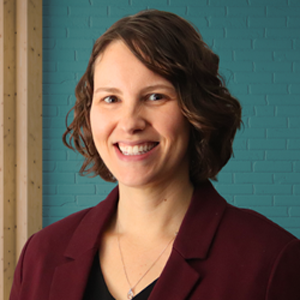All Saints Church-Community Centre is celebrating its 150th anniversary, and the community kicked off its year of festivities with a special worship service on All Saints’ Day. “That is the tradition here – to kick off the anniversary celebrations on All Saints’, which is our patronal,” says the Rev. Alison Falby, priest-in-charge.
Bishop Andrew Asbil celebrated and preached, and the congregation of 30 included past and present volunteers, donors and board members, as well as people from the wider community. Despite the cold fall temperatures, the service took place outside. “The drop-in was still running, and it meant that we could sing,” says Ms. Falby. “It was very cold, I have to say!”
The anniversary celebrations will continue until All Saints’ Day in 2022, with former incumbents coming back to celebrate and preach. “We have a visiting celebrant or preacher each month. Archbishop Fred Hiltz is starting us off in January, Archbishop Linda Nicholls is coming in June, and Archbishop Mark MacDonald is concluding our celebrations with us on the next All Saint’s Day,” says Ms. Falby. On June 16, the actual anniversary of All Saints’ first service, the community is planning a big barbecue, if COVID-19 restrictions allow for larger gatherings with food and drink by then.
With the theme “A Corner of Belonging for 150 Years: Sharing our Stories,” Ms. Falby says the community is hoping it will be a year of storytelling. “We’re asking people to share their stories of how they’ve experienced belonging at All Saints, and their general memories. We took videos of a few people on Nov. 1, and we’re going to have other opportunities for people to share their stories through the year,” she says. One tool for that will be a new website, which will include a way for people to submit their memories.
Ms. Falby is also working on a partnership with Ryerson University to undertake an oral history project. “The history of All Saints is really tied up with the history of the poor in Toronto, and it’s a history that doesn’t get a lot of attention. People here have great stories,” she says.
The anniversary year is a welcome celebration in a community that has experienced some of the harshest effects of COVID-19. Located at the corner of Sherbourne and Dundas streets in Toronto, All Saints serves some of the city’s most economically disenfranchised people. As one of the only drop-ins that stayed open during the first wave of the pandemic, the ongoing effort has taken a toll on its staff and its budget. “Most of the people who spend time in our drop-in are unhoused. Many of them are sleeping rough, and we want to be able to provide space for them,” says Ms. Falby. Meanwhile, staff have had to put programs on hold and limit the number of people inside the building.
Still, there has been no shortage of encouragement during the last two years. “Seeing how resilient our community is, is pretty amazing. There are people who’ve had a harder time with COVID than I have who still are tremendously faithful and every day say that where there’s life, there’s hope. The constant reminder of that is a great joy,” says Ms. Falby. “Tired as we are, knowing that we have been here for the community gives me very deep satisfaction.”
The pandemic has brought new ministries and opportunities as well. A prayer group has started meeting weekly, and the new website will include a way for people to ask for prayers. All Saints has also formed new partnerships with organizations, churches, and individuals providing support. “We know we’re not in it alone,” says Ms. Falby. “People really want to help and be in partnership with us, and that has been incredibly life-giving.”
When she considers what she’d like to see in the next few years, her first concern is for the welfare of her community. “I would love to see more people housed. We’d really like to see more supportive housing for members of our community,” she says. “Also, being able to make more long-term plans and have more stability would be one of my greatest hopes.”
While not every parish is located in a neighbourhood so clearly in need of ministry with the underserved and underprivileged members of society, Ms. Falby says she’d encourage every community to build these meaningful relationships in their own contexts. “Fr. Greg Boyle, who founded Homeboy Industries in Los Angeles, said that we are not called to serve the poor; we are called to kinship with the poor, which is a very different thing. There is much greater joy in being in kinship with the poor rather than merely serving them,” she says. “Being in kinship with people who are different from us is a way to be transformed ourselves, but also to transform our communities.”





Lent is an invitation to tear down walls